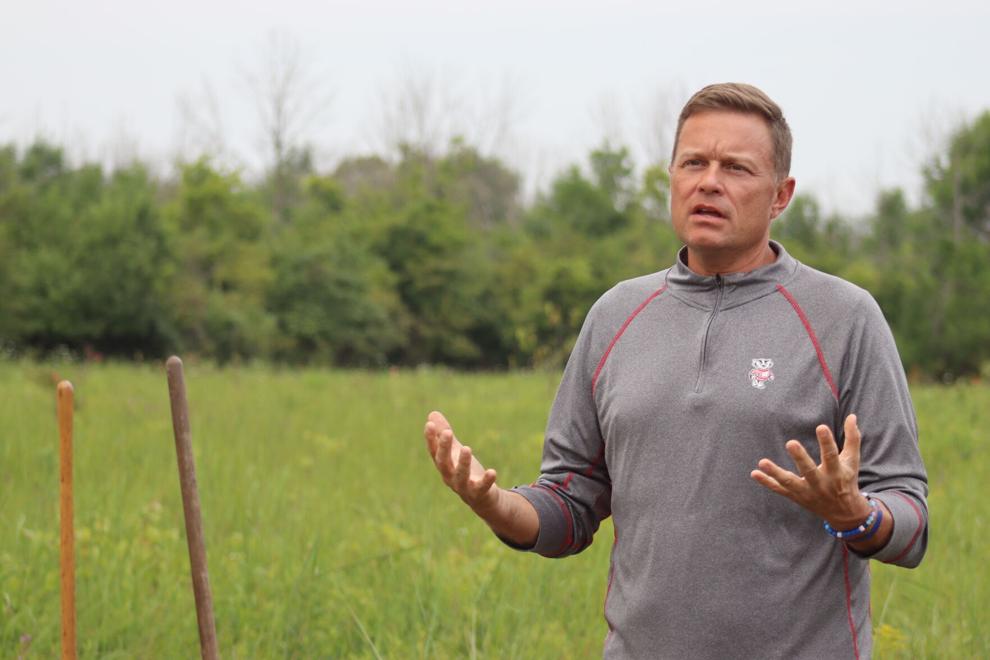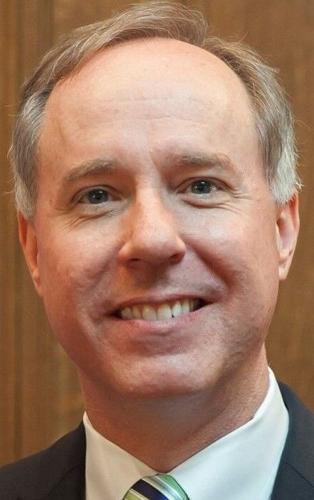Saturday, June 29, 2024
Arajs Kommando: The WW2 Extermination Group That Massacred Thousands | Nazi Collaborators
I have no reason to post this other than the fact that my parents were Latvian immigrants to the U.S.A. in the late 1940's and they both lived in Riga, Latvia during the time of the atrocities documented in this video. They never spoke to me about this. My father used to discuss these times with a fellow Latvian drinking buddy of his. They spoke in Latvian and I heard the name Ulmanis mentioned many times. It appeared that my father's friend liked Ulmanis and my father did not.
Is there a summer wave of COVID cases in Wisconsin?
Maia Pandey
Most of the country, including Wisconsin, is seeing a summer uptick in COVID-19 cases — but experts say the numbers are not yet a cause for concern and consistent with seasonal fluctuations in the virus.
As of June 18, the number of infections was growing or likely growing in 39 states and territories, according to the Centers for Disease Control and Prevention. The CDC estimates there is about a 95% chance case numbers are growing in Wisconsin. No states are seeing cases decline.
The increase in cases also comes as a new strain of the virus becomes the most dominant in the country: the KP.3 variant accounted for 33.1% of cases as of June 22, up from 25.9% in early June, according to the CDC. The variant outpaced JN.1 as the most dominant in May and has been on the rise since.
What are COVID levels like in Wisconsin?
Both the CDC and Wisconsin Department of Health Services no longer track individual COVID cases, but rather estimate transmission based on emergency department visits and hospitalizations or wastewater testing. In Wisconsin, the number of hospitalizations due to COVID went up 14% between June 9 and June 22.
More specifically, hospitalizations are climbing in northeast, north central, western and south central regions of the state, according to DHS. The north central region saw the highest increase, with COVID hospitalizations rising 43% in June. The southeast region, which includes Milwaukee, saw no significant change in COVID hospitalizations throughout June.
As of June 22, wastewater testing across the state also shows a slight uptick in levels of COVID detected, with seven of the collection sites reporting a “significant increase.” But take these numbers with a grain of salt: the levels of detected virus are still far below the highs detected in 2021 and 2022, and virus levels have been decreasing overall since January.
Most Wisconsin cities are seeing historic low levels of COVID, especially compared to the winter surges in the virus, according University of Wisconsin-Milwaukee professor Sandra McLellan, whose lab works with the state on wastewater testing.
“When you’re in low numbers, a few increases can make it look like it’s doubling and tripling, when, in fact, it’s just kind of the variability you might expect,” McLellan said.
The slight rise in COVID is consistent with what experts have seen in past summers, with virus levels rising in August 2022 and 2023, she added.
“That might be that people are gathering — there’s a lot of outdoor festivals, there's a lot of mass gatherings going on,” McLellan said. “But it’s not near what we see in the wintertime, when it can really spike up.”
How will the Republican National Convention affect COVID spread in the city?
In Milwaukee, the Jones Island test site reported a moderate level of COVID, and the south shore test site reported a low level. But this data, which was last updated June 26, doesn’t account for potential cases during the second and third weekends of Summerfest and the upcoming RNC.
McLellan said the lab anticipates increases in the virus during large events in most cities: for example, cases usually tick up in Green Bay during the first couple Green Bay Packers games, she said.
For the RNC, however, the lab plans to increase its testing from twice weekly to daily during the week before, after and during the event — which it has not done previously for other large events. An estimated 50,000 people will come into the city for the four-day convention.
Though the data will likely not be available before people leave town for the convention, McLellan hopes it encourages people to refer to the state’s COVID data more often and monitor the spread of the virus in their city.
“We really encourage people to look at the dashboard,” McLellan said. “I think that really is helpful as people are deciding, ‘Do I want to go to gatherings with a lot of people, or do I want to take some extra precautions?’”
Racine County Executive Jonathan Delagrave unexpectedly dies Friday morning
Ryan Patterson
RACINE — Racine County Executive Jonathan Delagrave died unexpectedly Friday morning.
Delagrave was first elected county executive in 2015.
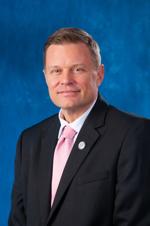
Delagrave
County Board Chairman Tom Kramer will assume the duties and responsibilities of county executive until the position is filled, according to a Racine County statement.
In the statement, Racine County expressed “deepest sorrow and profound compassion” at the death of the “beloved” Delagrave.
“This tragic loss has left our community in a state of great sadness, as we mourn the untimely departure of a remarkable leader, devoted public servant and cherished friend,” the statement reads. “Jonathan’s unwavering commitment to improving the lives of all those within our county was truly inspirational, and his compassionate approach to governance touched the hearts of countless individuals. In this difficult time, our thoughts and deepest sympathies are with Jonathan’s family, friends, colleagues, and the entire community.”
The county statement asked for privacy for Delagrave’s family members “as they navigate through this tremendous loss.”
Delagrave was born and raised in Racine County and lived in the area his entire life. He began working for Racine County in 2003.
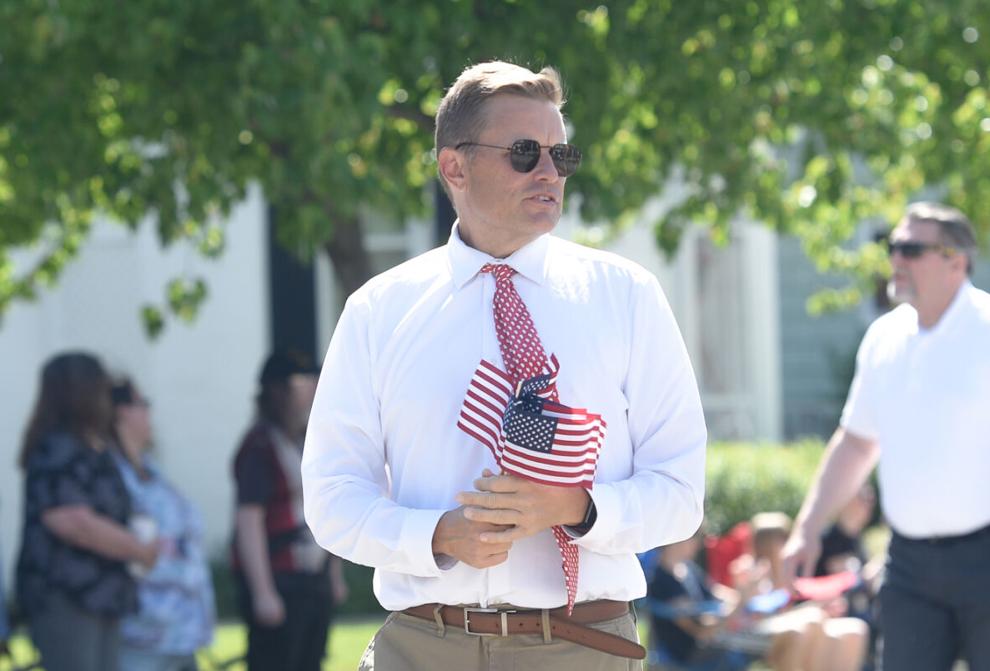 |
Racine County Executive Jonathan Delagrave hands out flags during Racine's 2023 Memorial Day Parade. Delagrave died unexpectedly Friday morning. JOURNAL TIMES FILE PHOTO |
In a statement, Racine Mayor Cory Mason said he has known Delagrave since they were 14 years old and Case High School classmates.
“As mayor, it has been an honor to serve alongside him in his role as county executive,” Mason wrote. “Jonathan was an amazing leader for Racine County. We are all at a loss from his passing. Our hearts go out to his family and friends.”
In a statement, Assembly Minority Leader Greta Neubauer, D-Racine, said she was “devastated” by Delagrave’s death.
“I am heartbroken for his family, friends, loved ones, and especially his two children,” Neubauer wrote. “Throughout his service to our community, he has been an incredible leader and champion for Racine County and its residents. I was lucky to have a personal friendship with Jonathan and to be able to collaborate over the years — I will deeply miss him. His impact will be felt around Racine County for years to come. We will all remember him as a community leader, public servant and friend.”
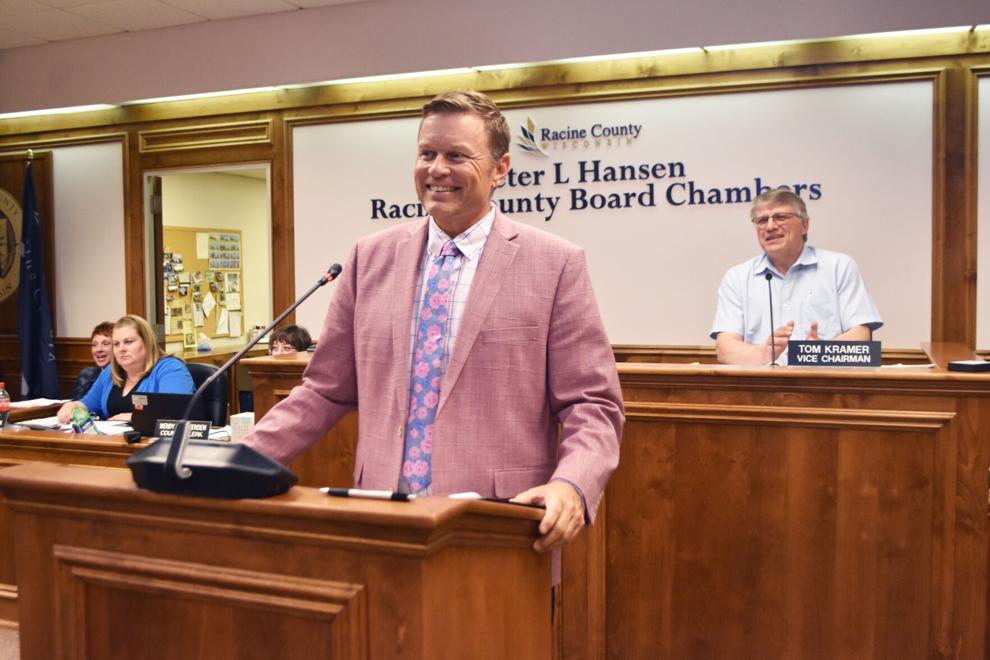 |
Racine County Executive Jonathan Delagrave delivers his 2023 State of the County address. Delagrave, who was born and raised in Racine County and lived in the area his whole life, died unexpectedly Friday morning. Scott Williams |
State Sen. Van Wanggaard, R-Racine, wrote on Twitter that Delagrave was like a little brother and had “a great, positive spirit.”
“It was never ‘can’t do’ with Jonathan, it was always ‘how can we do,’” Wanggaard wrote. “The emphasis was on the ‘we.’ I will miss you, my friend.”
Ritu Raju, Gateway Technical College president and CEO, said in a statement that the college community “is deeply shocked and saddened” by Delagrave’s passing.
“He worked closely to collaborate with Gateway on many different programs and was a champion for education,” Raju wrote. “I personally appreciate his work with myself and the college, and he will be deeply missed by all.”
State Rep. Robert Wittke, R-Racine, said in a statement that he was “deeply saddened” by the death of Delagrave.
“Jonathan was an honorable man who served the residents of Racine County very well for nearly a decade,” Wittke wrote. “I appreciated his governing style and certainly each and every discussion we shared about the needs of Racine County and its residents. He will be missed. My deepest condolences to his family during this time.”
David DeGroot, Mount Pleasant Village Board president, said in a statement that Delagrave’s “visionary leadership” will be missed.
“Jonathan was not only a trusted advisor, collaborator, partner, and friend of the Village, but was personal friends with many of us as well,” DeGroot wrote.
Also see from the JSOnline: https://www.jsonline.com/story/news/2024/06/28/racine-county-executive-jonathan-delagrave-dies-suddenly/74250080007/
Friday, June 28, 2024
Nights in Wisconsin cities have become hotter. The cost is beyond just loss of sleep.
Madeline Heim
Climate Central, a nonprofit organization that reports on climate science, found that countries around the world are seeing a growing number of nights during which the temperature does not fall below 68 degrees Fahrenheit. That's above what medical experts say is the optimal range of temperatures for getting a good night's sleep.
The stakes are high — prolonged sleeplessness can cause brain fog, worsen anxiety and depression, and even increase risk of heart attack and stroke. Experts say this is one more example of the effects of human-caused climate change, and that vulnerable populations will feel them disproportionately.
"Those of us who have the means, we can cool our nighttime environment," said Dr. Lisa Cottrell, a clinical health psychologist in Milwaukee who specializes in sleep issues. Cottrell is a member of Healthy Climate Wisconsin, a group of health professionals advocating for climate action. "Those of us who don't have the means to do that, there isn't anything they can do."
The Climate Central analysis compared real-life nighttime temperatures over the last decade to a model estimating the nighttime temperatures that would have occurred absent the effects of climate change. The difference between those two numbers is what they deemed the number of additional hot nights due to climate change.
In Wisconsin:
- Appleton experienced an average of 16 more uncomfortably hot nights per year in the last decade.
- Madison, Kenosha and La Crosse experienced an average of 14 more hot nights.
- Green Bay experienced an average of 12 more hot nights.
- Milwaukee, Eau Claire and Racine experienced an average of 11 more hot nights.
Extreme heat interrupts the body's sleep cues
Intuitively, it's easy to picture why a hot night could become a sleepless one. It's hard to get comfortable enough to doze off. The U.S. Centers for Disease Control and Prevention recommends a "comfortably cool" room temperature of about 65 to 68 degrees Fahrenheit to produce good sleep.
Extreme heat interrupts the body's sleep cues
Intuitively, it's easy to picture why a hot night could become a sleepless one. It's hard to get comfortable enough to doze off. The U.S. Centers for Disease Control and Prevention recommends a "comfortably cool" room temperature of about 65 to 68 degrees Fahrenheit to produce good sleep.
That's on top of things like heat stroke, heat exhaustion and injury to the kidneys from dehydration that happen during heatwaves.
More:Latest National Climate Assessment paints sweeping picture of climate threats to the Midwest
Mentally, "it's the basic stuff" that a lack of sleep impairs, Cottrell said — short-term memory, problem-solving ability, emotional regulation and other mental functions. People's ability to handle daily stressors declines, she said, and those who have anxiety and depression are likely to see their symptoms worsen.
Hot, sleepless nights aren't experienced equally
Historically cooler states like Wisconsin are already uniquely vulnerable to the effects of extreme heat, Getzin said, because our bodies aren't accustomed to higher temperatures and many of our buildings don't have air conditioning.
She pointed to a paper from the National Bureau of Economic Research that suggests that without adaptation measures to account for a hotter world, the Midwest and Great Plains are projected to see the largest impacts to mortality due to their current lack of preparedness for extreme heat
Like many cities, Milwaukee experiences a phenomenon known as the urban heat island effect, where an abundance of manmade surfaces like parking lots, sidewalks and streets absorb and hold onto heat. That can produce temperatures several degrees hotter than the temperature forecast in certain parts of the city during heat waves, another Climate Central analysis found last year. Punishing heat also tends to affect communities of color more due to historic redlining policies that pushed those residents into more industrial areas with less tree canopy cover.
Without addressing the root causes of climate change by limiting the burning of fossil fuels and switching to cleaner forms of energy, Cottrell said, "it is the most vulnerable people who are going to suffer" from hot, sleepless nights.
Madeline Heim is a Report for America corps reporter who writes about environmental issues in the Mississippi River watershed and across Wisconsin. Contact her at 920-996-7266 or mheim@gannett.com.
'Good luck America': Biden debate performance leaves voters in liberal Madison lamenting choice
Laura SchulteTristan Hernandez
Even in Wisconsin's liberal bastion, the capital city of Madison, President Joe Biden's debate performance with former President Donald Trump left voters at a watch party lamenting their choice in the election.
Biden's voice was hoarse and raspy from the start Thursday night. He stumbled over words and had to correct himself with numbers. He was sometimes hard to follow. On one occasion, the president appeared to lose his train of thought, concluding − confusingly − with the line, "we finally beat Medicare."
Noah Anders, 24, grimaced when asked what he thought about the debate.
"It was a painful experience to sit through. Neither candidate inspires our country,” Anders said. The Madison resident soon to start law school at the University of Wisconsin said the debate left him with concerns about Biden’s cognitive abilities but that he also questions Trump’s mental abilities.
"To be president you deal with a lot of tough issues, and I don't know if they have the ability to navigate the nuance and hardships of the job," he said. "Good luck, America."
Timothy Sanders, 48, said despite the president’s shaky performance he is still optimistic about Biden, but he acknowledged the president didn't sound as crisp at a time that optics could be important to the election..
"I'm not concerned at all about his age. If you had a grandpa who took you fishing and had a stutter, you would still trust him," he said. "You wouldn't put him in a debate on live television if you could avoid that because that's entertainment. That's not fair."
Sanders vowed to campaign for Biden, because he doesn't want to see Trump elected again.
"I think we're in a very dangerous place," he said.
The comments came at what should have been a friendly space for the Democratic president. The debate was hosted at The Barrymore Theater by Madison-based The Devil's Advocate Radio and The Progressive magazine, a political publication based in the same city. Several hundred attendees wore Biden Harris t-shirts and enthusiastically purchased popcorn and beer.
Then the televised debate started.
"I resent having to choose one of them" said Jesse Clingan, 42, a construction worker from Milwaukee.
"It's kind of picking the worst of two evils, Clingan said. "But at the end of the day, I’d rather have (Biden) on his worst day than Trump at all."
Heidi Robertson, 48, a job coach in Madison, said that she noticed Biden was a bit "fumbly" and that it felt "cringey," but what he was saying was good.
"He's going too fast. He needs to slow down with his talking to get all his thoughts out," she said.
The debate could compound a big problem in Biden's campaign in the vital swing state of Wisconsin: flagging enthusiasm for his campaign among Democrats.
A Marquette University Law School poll issued Wednesday, a day before the debate, underscored the issue.
The poll showed Trump and Biden deadlocked in Wisconsin both with registered voters and likely voters, but the underlying numbers presented a warning sign for Biden, according to poll director Charles Franklin. Trump is scheduled to officially receive the Republican nomination at the party's national convention in less than three weeks in Milwaukee.
Voter enthusiasm is overwhelmingly on Trump's side and that could be decisive in November, Franklin said.
"Here's a path for Joe Biden to lose this election pretty badly, is that he's failed to inspire his supporters," Franklin said Wednesday at an event on Marquette's campus. "They're unenthusiastic about him and his campaign, and they're much less likely to vote than those who are very enthusiastic, who overwhelmingly are for Trump."
Wednesday's poll shows voters who think of themselves as very enthusiastic to vote are siding with Trump over Biden 61% to 39%, and voters who describe themselves as having lower levels of enthusiasm lean toward Biden by significant margins, Franklin said.
"This raises a big question about turnout and what matters here, because Biden has real strength among the voters who are not engaged," he said. "Trump has real strength among the people who are really excited to participate. And so how does this balance out?"
At a watch party at Carthage College in Kenosha, voters felt dissatisfied with both Biden and Trump’s performance in the debate. The watch party was hosted by Braver Angels, a group that hopes to bridge the U.S. partisan divide, and attendees agreed that both candidates did poorly Thursday night.
“The contest of ego — it got really old really quick,” said Rebecca Cataldi, 43, of Arlington, Va. “It would have been nice if they had been willing to put that aside and been willing to talk about what we need.”
Cataldi said that it felt like the country was being “bullied” into choosing either Biden or Trump and she wasn’t happy to have to vote for either
Aletheia Underhile, a student at Dakota Wesleyan University in South Dakota, said she liked the questions the moderators posed during the debate, but that her biggest gripe was that they allowed the candidates to go off-topic with their answers.
Underhile, who is 20, said the 2024 is “discouraging” for the first presidential contest she can vote in, and wants to learn more about the third party candidates before she makes her final decision.
“My perspective is essentially picking Biden or Trump is me deciding which is the lesser of two evils, and I'm not willing to choose any evil, even if it is the lesser of two evils,” she said after the debate.
Journal Sentinel reporter Molly Beck and USA TODAY reporters Joey Garrison and Josh Meyers contributed.
Laura Schulte can be reached at leschulte@jrn.com and on X at @SchulteLaura
From: https://www.jsonline.com/story/news/politics/elections/2024/06/27/biden-debate-performance-leaves-voters-in-liberal-madison-uninspired/74195801007/
Much more in-depth coverage of the debate: Presidential debate replay: Democrats sweat after Joe Biden freezes during pivotal debate
Personally, I think that both candidates are shit. Oh woe is us.
Wisconsin Elections Commission rejects recall election against Speaker Robin Vos
- MITCHELL SCHMIDT
Assembly Speaker Robin Vos, one of the state Legislature’s most powerful Republicans, will not face a recall election this fall, the Wisconsin Elections Commission decided Thursday.
In a 4-2 vote, the bipartisan commission determined that close to 200 signatures submitted by the group seeking to force a recall election against Vos, R-Rochester, were collected after the deadline set in state law and should be deemed invalid.
The decision prompted the Racine Recall Committee, led by Republicans frustrated with Vos for not pursuing impeachment of the agency’s nonpartisan administrator Meagan Wolfe, to call for “the immediate dismantling” of the commission.
Democratic commissioner Carrie Riepl joined her Republican colleagues Don Millis, Bob Spindell and Marge Bostelmann in the decision, which brought the total number of valid signatures down to 6,678, below the 6,850 needed in Vos’ old 63rd Assembly District to force a recall.
Organizers behind the recall effort had 60 days, or until May 26, to collect signatures. However, that period ended the Sunday before Memorial Day, meaning the holiday weekend pushed the date that petitions had to be turned in to the following Tuesday, May 28.
The four commissioners determined that roughly 188 signatures collected on May 27-28 can not be counted, with Democratic commissioners Ann Jacobs and Mark Thomsen opposed.
Thomsen argued the motion to reject the signatures — made by Millis, Vos’ appointee to the agency — was based on a technicality and essentially gives “the most powerful person in the Assembly a free pass.”
“If we just do that, this whole state is going to think this whole thing is just rigged to keep power, and we can’t do that,” Thomsen said before the vote.
Millis said recall organizers were notified that signatures collected after the 60-day window would not be counted.
“I disagree with the idea that we’re giving Rep. Vos a pass,” Millis said. “I don’t think we’re denying anyone’s right to recall. It certainly is a close call in terms of the number of signatures.”
Recall organizers said in a statement after the vote the commission “has demonstrated that it is set up to protect those in power rather than to fairly administer elections and uphold election laws.”
The four commissioners determined that roughly 188 signatures collected on May 27-28 can not be counted, with Democratic commissioners Ann Jacobs and Mark Thomsen opposed.
Thomsen argued the motion to reject the signatures — made by Millis, Vos’ appointee to the agency — was based on a technicality and essentially gives “the most powerful person in the Assembly a free pass.”
“If we just do that, this whole state is going to think this whole thing is just rigged to keep power, and we can’t do that,” Thomsen said before the vote.
Millis said recall organizers were notified that signatures collected after the 60-day window would not be counted.
“I disagree with the idea that we’re giving Rep. Vos a pass,” Millis said. “I don’t think we’re denying anyone’s right to recall. It certainly is a close call in terms of the number of signatures.”
Recall organizers said in a statement after the vote the commission “has demonstrated that it is set up to protect those in power rather than to fairly administer elections and uphold election laws.”
The group in March submitted more than 9,000 signatures seeking to recall Vos, but the elections commission denied the request after determining only 5,905 signatures were valid.
Racine County District Attorney Patricia Hanson earlier this year said her office had fielded numerous calls about possible identity theft from electors who said their names had fraudulently been added to the first recall petition effort.
The recall drive was launched by Republicans frustrated that Vos refused former President Donald Trump’s request to overturn Wisconsin’s 2020 presidential election. Overturning the election is not something the speaker is empowered to do under state law and the state Constitution.
Vos further angered the group by not pursuing impeachment of the election commission’s nonpartisan administrator Meagan Wolfe, as some Republicans have demanded.
Thursday, June 27, 2024
New Marquette poll puts Biden and Trump in a dead heat but with ominous signs for Biden
Molly Beck
According to the latest Marquette University Law School poll, the incumbent Democratic president is tied with his Republican predecessor among registered Wisconsin voters in the battleground state where statewide races are often decided by just a few thousand votes. Among likely voters, Biden leads Trump 51% to 49%.
Voter enthusiasm, however, is overwhelmingly on Trump's side and that could be decisive in November, according to Marquette University Law School poll director Charles Franklin.
"Here's a path for Joe Biden to lose this election pretty badly, is that he's failed to inspire his supporters," Franklin said Wednesday at an event on Marquette's campus. "They're unenthusiastic about him and his campaign, and they're much less likely to vote than those who are very enthusiastic, who overwhelmingly are for Trump."
Wednesday's poll shows voters who think of themselves as very enthusiastic to vote are siding with Trump over Biden 61% to 39%, and voters who describe themselves as having lower levels of enthusiasm lean toward Biden by significant margins, Franklin said.
"This raises a big question about turnout and what matters here, because Biden has real strength among the voters who are not engaged," he said. "Trump has real strength among the people who are really excited to participate. And so how does this balance out?"
Franklin said Democrats' tendency to vote at higher rates if they have enthusiasm also could keep the race a guessing game.
"Democrats have an advantage now that their voters who are higher turnout voters. That is true, but enthusiasm plays a role in this as well, and that's where Democrats are really suffering right now. So I don't know how this is going to turn out," he said.
More:Biden's Wisconsin campaign plans 'massive mobilization effort' centered around CNN debate
When factoring in third-party candidates, Trump leads Biden by two percentage points (43% to 40%) in Wednesday's poll.
The poll surveyed 871 registered voters in Wisconsin between June 12 and June 20. In that sample, 784 are considered likely voters. The poll's margin of error was plus or minus 4.6 percentage points.
In April, Marquette pollsters found Biden and Trump effectively tied with an edge to Trump, separated by just 2 percentage points — within the margin of error.
Among both registered voters and likely voters surveyed in April, 51% supported Trump while 49% supported Biden. That includes undecided voters (8% of those polled) who were then asked, if they had to choose right now, who they would support. Undecided voters tended to break toward Biden, Franklin said in April.
Pollsters also surveyed Wisconsin voters on Trump's recent criminal conviction, with 50% of registered voters supporting the prosecution of Trump over allegations he paid a porn star to keep quiet about a sexual encounter ahead of his 2016 presidential campaign. A New York jury found him guilty on 34 felony counts in the matter
Forty-two percent of Wisconsin voters said they should not have been prosecuted while 8% said they didn't know enough to have an opinion.
On whether Biden's son Hunter Biden should have been prosecuted for felony gun charges, 76% of voters agreed it was the right call. Eleven percent said he should not have been brought to trial while 13% said they didn't know.

